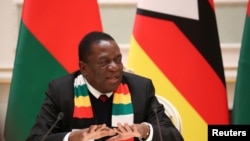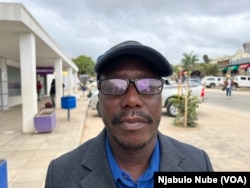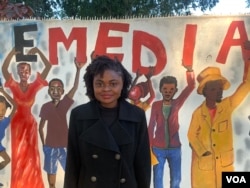Before his arrest Monday, ZimLive editor Mduduzi Mathuthu had been in hiding for about two weeks.
He got worried after unidentified people had come to his home in the city of Bulawayo, saying police were looking for him.
But Mathuthu, who spoke with VOA before his arrest, said at that time, neither the police spokesperson nor the central police station appeared to know if he was wanted.
“So I called the police spokesperson Paul Nyathi," Mathuthu said. "He didn’t know anything. I sent the lawyer to go to central police station. He was informed that no one was looking for me. So it began this mysterious situation where we started feeling that perhaps the intentions of those who came to the house were not as good. We then filed a report with the police for attempted abduction or kidnapping.”
Police later wrote to Mathuthu’s lawyers saying they wanted to interview him. And when he was taken into custody Monday, he was told the case is linked to a tweet commenting on President Emmerson Mnangagwa’s appearance on national television.
In that tweet, Mathuthu said the president got drunk before coming on TV.
Njabulo Ncube, of the Zimbabwe National Editors Forum, said the arrest is raising concerns of media harassment over political coverage. Cases of journalist arrests are common during an election season, Ncube said. Zimbabwe is due to hold general elections in 2023.
“It’s a harbinger of things to come," Ncube said. "Ed (President Mnangagwa) has actually followed the footsteps of the late president Robert Mugabe. Nothing has changed. Journalism being treated like a criminal activity. Mr. Mathuthu must be allowed to practice his journalism unhindered.”
Upon taking power in 2017, President Mnangagwa – referred to some in Zimbabwe as “Ed,” after the initials of his first and middle names – he promised to improve the media landscape. But rights groups, including the Committee to Protect Journalists, have documented several cases of media workers detained or questioned in recent months for coverage of politics or local elections.
In Mathuthu’s case, the Media Institute of Southern Africa is providing legal assistance. The watchdog group says those convicted of undermining the president can face up to a year in prison.
Nompilo Simanje, from the watchdog’s Zimbabwe branch, said Mathuthu has come under pressure before for his journalism, including during protests in 2020.
“Mduduzi Mathuthu has been in a situation with police before when his home was ransacked in 2020 and his nephew was abducted over some accusations and MISA Zimbabwe had to intervene,” Simanje said. “So, following his emergency call for support, MISA Zimbabwe deployed a lawyer.”
Zimbabwe authorities declined to comment on Mathuthu’s case on Monday, saying they will talk only when the case is resolved. The journalist is due in court later this week.
Zimbabwe authorities declined to comment on Mathuthu’s case on Monday, saying they will talk only when the case is resolved. The journalist is due in court later this week.






